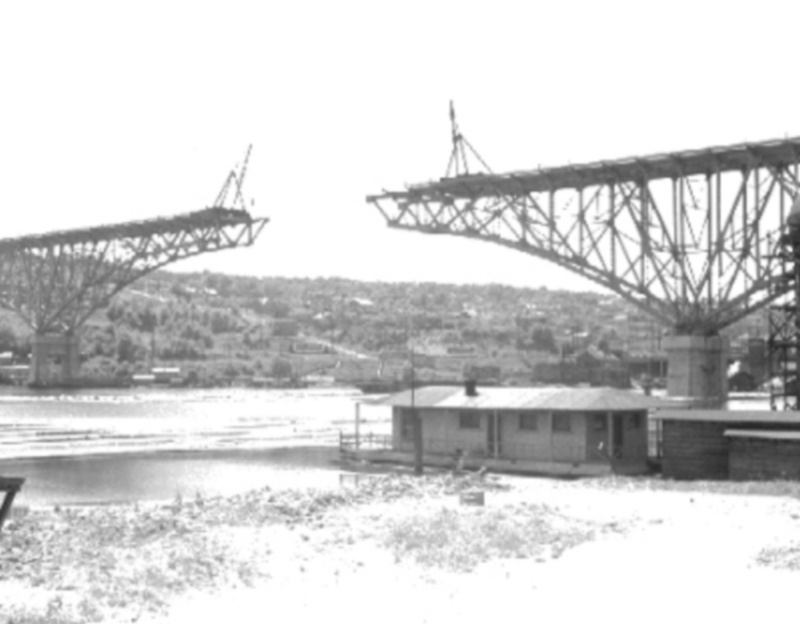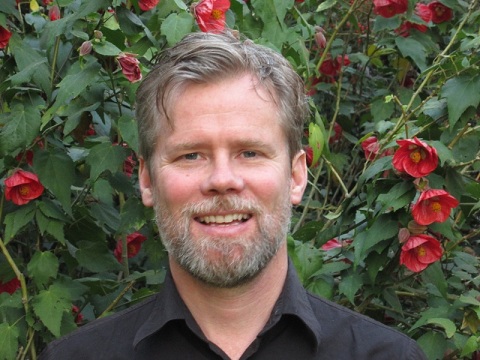I had an inspiring conversation with Nadine Weil of Heart of Green and Ecofabulous at Bioneers last weekend. I know Nadine from serving together on the board of Forest Ethics, though we don’t know each other much outside of that. Our encounter at Bioneers was by chance. I expected a friendly hello but got something completely unexpected.
We ran into each other at the Mother Jones table near the entrance to the exhibit hall. Nadine was headed to this large wooden sculpture of a woman holding up earth on the stage of the hall. I went with her to check it out.
The life-sized sculpture was thoroughly impressive. The woman was bent backwards holding the earth at the end of outstretched arms above and behind her head. This was a sturdy woman, but she was straining. A large crack ran up the middle of her sternum from her belly. It looked like she could collapse backwards at any moment. The earth she was holding had a handprint etched into the side of it between the woman’s hands. Nadine interpreted the handprint as an invitation for humans to push the earth and thus Mother Nature back into balance. That struck me as an astute interpretation.
Just above the handprint was a small, carved spiral. Nadine said she was fascinated with spheres and spirals lately. I asked her if she’d ever walked a labyrinth. She said yes, and that on one such occasion she had a flash of insight that prompted her to leave the world of cube farms to do environmental work. I told her about a similar moment that lead me to begin work on sharing solutions.
It was affirming to share our stories of change. From there we talked briefly about our respective projects. While we didn’t speak about this directly, Nadine helped me see sites like Ecofabulous and Shareable as representing points on a continuum of change. That while green consumption alone may not result in the green house gas reductions we need or lead to better social conditions, it can be the thin end of a wedge of change. It meets hundreds of millions of people where they are – in the marketplace – and can, at least theoretically, be the starting place for deeper personal and social transformation. Despite the damage that consumer culture does, I believe change begins in familiar places.
The risk, however, is that green consumption is seen as the destination and not the starting place of a journey. Or that people get focused on changes that make almost no difference, but, as
Graham Hill of Treehugger said in his recent GEL conference presentation, represent “feel good environmentalism.” In any case, simply changing the stuff we own will neither get us the green gains we need nor address the root cause of our environmental and social problems. Like the wooden statue at Bioneers, the developed world’s priorities are out of balance. Economic growth is valued above all else, including human and environmental well being.
There’s also the rarely discussed issue of identity that a recent WWF report
Meeting Environmental Challenges: The Role of Human Identity raises. The report talks about how some environmental campaigning reinforces materialistic and self-enhancing values, values that in the long run work against environmental goals. The report is a deep and sobering criticism of the environmental movement from one of the largest environmental organizations on the planet. We should listen. Green consumerism could be doing the same thing by reinforcing a well-established frame in
consumer culture that suggests we form identity through what we buy. In this way, stuff becomes representative of status and segregate us by our buying power. It doesn’t have to be this way. Buying green together and sharing stuff can be points of solidarity.
I also began to think of sharing as a bridge from green consumption to deeper personal and social transformation. From my experience, the initial impetus to share is often materialistic, for instance as a way to save money or get access to something you can’t afford on your own. But the results can be so much more. As my friend Robert Ford, a longtime member of Howard Langton Community Garden in San Francisco, has said to me, and I paraphrase here, “We started growing a garden, but ended up growing a community.”
In the case of the garden, they may have started with the idea to improve the built environment of the neighborhood, but what happened along the way is that people of diverse backgrounds learned to work together. They built something beautiful to enjoy, and unexpectedly came to appreciate the importance of healthy relationships to a healthy garden. Sharing can “bridge” to personal and social change that are often more satisfying than the material gains.
So what can be done about all of this? Below are my hopes for how green consumption and sharing can work together to help push society and Mother Nature back into balance:
- Green media leaders use their influence to get wider recognition of green consumption as a starting place – and not a destination – on a longer journey of personal and social transformation. Plus point the way to next steps including sharing.
- Sharing becomes recognized as a bridge between green consumption and deeper transformation, and not as somehow better but rather as part of a continuum of change.
- Green media and sites like Shareable find ways to collaborate to better serve their communities by offering a range of solutions – some store bought, some community powered, and others that combine both.
- Green consumption is combined with what Rachel Botsman and Roo Rogers are calling collaborative consumption to help environmental products achieve price parity with traditional products – plus offer a familiar entrée to a Shareable lifestyle.
For discussion in comments:
Do you think green consumption and sharing are bridges to the deeper changes we need? What would you add to the above list?
My call to action:
If you think this is an important discussion, then please share this post with your friends and family so they can join in.









